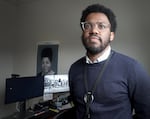The most recent meeting of the Bend Human Rights and Equity Commission began like it usually does, with roll call. As each name was read aloud, the commissioners on this volunteer advisory board offered a self-description — personal information like their gender, hairstyle, skin color, or what they were wearing that day — a practice meant to help visually-impaired people take part in discussions about how the local government can better serve those who’ve historically been left out of decision making.
When the meeting turned to public comment, seven people, most of them online, had signed up to say something. First in line was an 11-year-old girl who was there in person with her dad. She stepped up to the microphone in front of city hall’s imposing dais just long enough to share her name, plus one thought: “Rights for everyone,” she said.
John Heylin was proudly filming his daughter with his phone. He stood up next to say he had brought his kids to the meeting because he “wanted them to see that there are people in our town fighting for equality.”

In this screenshot from video, John Heylin, left, speaks at the Bend Human Rights and Equity Commission meeting, March 27, 2024, in Bend, Ore. Public comments during the meeting later prompted the city to remove the video from its public channel.
Screenshot/City of Bend / Screenshot/City of Bend
Recent public opinion surveys show that, like Heylin, the majority of Americans support DEI programs for most professions. But, political polarization is fueling a backlash with a vocal minority. Republican politicians around the country have sought to end public DEI initiatives, and opinion polling suggests that effort often appeals to people with racist views.
Bend’s DEI leaders experienced this firsthand when they heard the rest of the public comments at their last meeting.
“My pronouns are fist/punch,” began someone calling himself Chad Baseball. “I am pretty angry about all this nonsense that’s happening across the country with these equity inclusion seminars.”
Another speaker pronounced: “DEI stands for didn’t earn it,” and another, clearly reading from a prepared statement, said: “White people are sick and tired of being attacked, robbed, raped, and murdered.”
These snippets were just the first act in what appeared to be a coordinated and increasingly hateful performance over Zoom. More disembodied voices began to use antisemitic slurs, Nazi slogans and homophobic insults. One man chanted the N-word over and over, until city staff cut off his mic.
Bend’s newly hired Equity and Inclusion Director Andrés Portela III led the meeting through the hate-filled disruption and its aftermath.
“I am so sorry y’all,” he said. “This does not happen often. Let’s take a second.”
After a 10-minute break, assistant city attorney Ian Leitheiser briefly addressed the clearly shaken room about Oregon’s staunch free speech protections.
“There’s a certain amount of stuff, narratives, content that you might believe — and that most reasonable people might believe — is objectionable, cowardly, spineless, utter bullshit, that you’re going to have to listen to,” Leitheiser said.
Related: Corporate DEI initiatives are facing cutbacks and legal attacks
A week later, Commissioner Carolyn Peacock Biggs remembered the intense grief she felt at that moment.
“I could not stop weeping. It felt like I was grieving for generations of pain that was in my DNA that wouldn’t allow me to act like I didn’t hear what I heard,” she said in an interview.
Peacock Biggs volunteered to advise the city on its DEI efforts two years ago. Overall, she said it’s been a rewarding experience.
“I’m most proud of being able to be an example to people who otherwise wouldn’t know what a Black woman was like,” she said.
Bend’s population is nearly 90% white, demographics rooted in Oregon’s history of racist exclusion laws. After the incident last month, Peacock Biggs now worries about being targeted personally.
“People couldn’t deny or confirm that these hate people were anywhere near,” she said. “In Bend, in 15 minutes you can get to me if you felt like it.”
Spreading backlash to DEI
Since the pandemic began, virtual meeting spaces have made it simple for hostile actors to remain anonymous. Portela became Bend’s equity and inclusion director eight months ago, and he wasn’t surprised hateful views surfaced at a public meeting.
He’s received local reports of people being called racial slurs while they’re out hiking, or a business having its Pride flag stolen repeatedly. These incidents are symptoms of a bigger problem, Portela said.
“The larger issue is the wave of undoing diversity, equity, and inclusion. The folks we’re working with have to hear that this space that was created to make sure that they feel safe and empowered in their government experience is going to disappear.”

Bend Equity and Inclusion Director Andrés Portela III at his city hall office on April 4, 2024.
Emily Cureton Cook / OPB
Utah is the latest Western state to ban any funding for programs dedicated to promoting diversity, including at state colleges and universities. Utah, North Dakota, Texas, Tennessee, North Carolina, Florida, Kentucky, Oklahoma and Alabama all have laws restricting or banning DEI programs in public institutions. Republican lawmakers in 25 states have introduced more than 75 such bills nationwide, according to PBS NewsHour.
This is happening as recent polling shows most Americans aren’t opposed to DEI programs. Surveys conducted this year by researchers at the University of Massachusetts, Amherst, suggest that on average, 7 in 10 Americans support DEI training for medical professionals, teachers, police officers, members of the U.S. armed forces and public employees, while 65% of Americans support this training for private sector employees.
The researchers found that many of those opposed to DEI have something in common — they hold negative views toward races other than their own, said UMass political science professor and lead researcher Tatishe Nteta.
His team gauged negative racial views by asking people questions like whether racial problems are rare in the U.S., whether white people have any advantages, or if the existence of racism makes them angry.
“What we’re finding is that this is the debate over DEI, this is really a larger discussion about how fast the country should change and who we should be, going forward,” Nteta said.
The politics underlying that debate are open to interpretation, he added.

FILE - Members of the Kentucky House of Representatives listen during a floor discussion of a House bill in Frankfort, Ky., Feb. 1, 2024. The Kentucky House voted Friday, March 15, to choke off funding for diversity, equity and inclusion offices at public universities following an impassioned debate that had a GOP lawmaker dismissing DEI efforts as a failure and Democrats defending them as pillars of support for students from underrepresented groups.
Timothy D. Easley / AP
“If you’re pessimistic, this is just another example of a sort of backlash towards efforts to ensure racial equality,” Nteta said. “If you’re more optimistic, this is in some ways a reflection of people’s commitment to the notion of colorblindness and the belief that the United States has effectively achieved the goal of a race-neutral society.”
More than 60 Oregon cities have diversity, equity and inclusion programs, including Bend and Hillsboro. Oregon-based policy analyst Steve Lee said that city staff being overly optimistic about racial equity posed one of the biggest barriers he faced as the first director of DEI programs for the city of Hillsboro.
“I kept bumping up against this idea of goodness, that we’re really good people here, and we’re doing our best to run our government, and we just couldn’t be racist,” he said.
Lee, who is Black, said he left the Hillsboro job feeling like city employees didn’t see a need to make changes to better serve people of color. A turning point came after he gave a written survey to his co-workers asking for their views about racial equity.
“I was surprised at the level of animus. Comments like, ‘We’re race-neutral.’ ‘Why are we even talking about this?’ ‘I don’t know why you’re working there.’ It became really personal.”
The meeting incident in Bend showcased hateful views that many people don’t want to acknowledge exist in their communities, he said, which is why the city’s reaction to what happened is especially critical.
“You don’t sweep it under the rug. You have to name it,” he said. “If you don’t, there’s no opportunity to transform people’s experience, or how they look at the world.”
Related: U. of Florida axes DEI office under GOP-led law aimed at ridding similar programs
Shining a light
For John Heylin, the dad who brought his kids to speak at the meeting, the hateful diatribes were a learning moment. Heylin is white.
“This was my first experience seeing that in person, and as much as I can educate myself, I’m not steeped in it like a lot of people are forced to be,” he said in an interview.
Heylin remembered turning to his 11- and 8-year-old daughters in the meeting and telling them: “This is why we do the work.”
For Bend Equity and Inclusion Director Portela, the immediate focus is on rebuilding local trust and a sense of safety for the commissioners and the communities they aim to serve.
One of the first steps of the city’s response was taking down video of the meeting from its YouTube channel, so that it’s no longer accessible except through a public records request.
“We thought about the retraumatization of someone having to watch the video online, so we took the video down,” Portela said. “There is a different way to center those who are directly impacted, and talk about how that becomes a part of our everyday work… I can tell folks all day that these things exist.”
Commissioner Peacock Biggs said she understands why the city removed the footage, but she also doesn’t personally agree with the decision.
“For so many centuries, we’ve spent our time trying to make everybody comfortable,” she said.
“People should be allowed to hear it. And who knows, somebody’s voice might be heard and be like, ‘You know what? That’s John. He lives on Hodge Road. I know that voice. We go fishing together.’”
Sometimes, she said, it’s good to shine a light on the shadows.

FILE - Bend City Council chambers in 2017.
Bradley W. Parks / OPB



